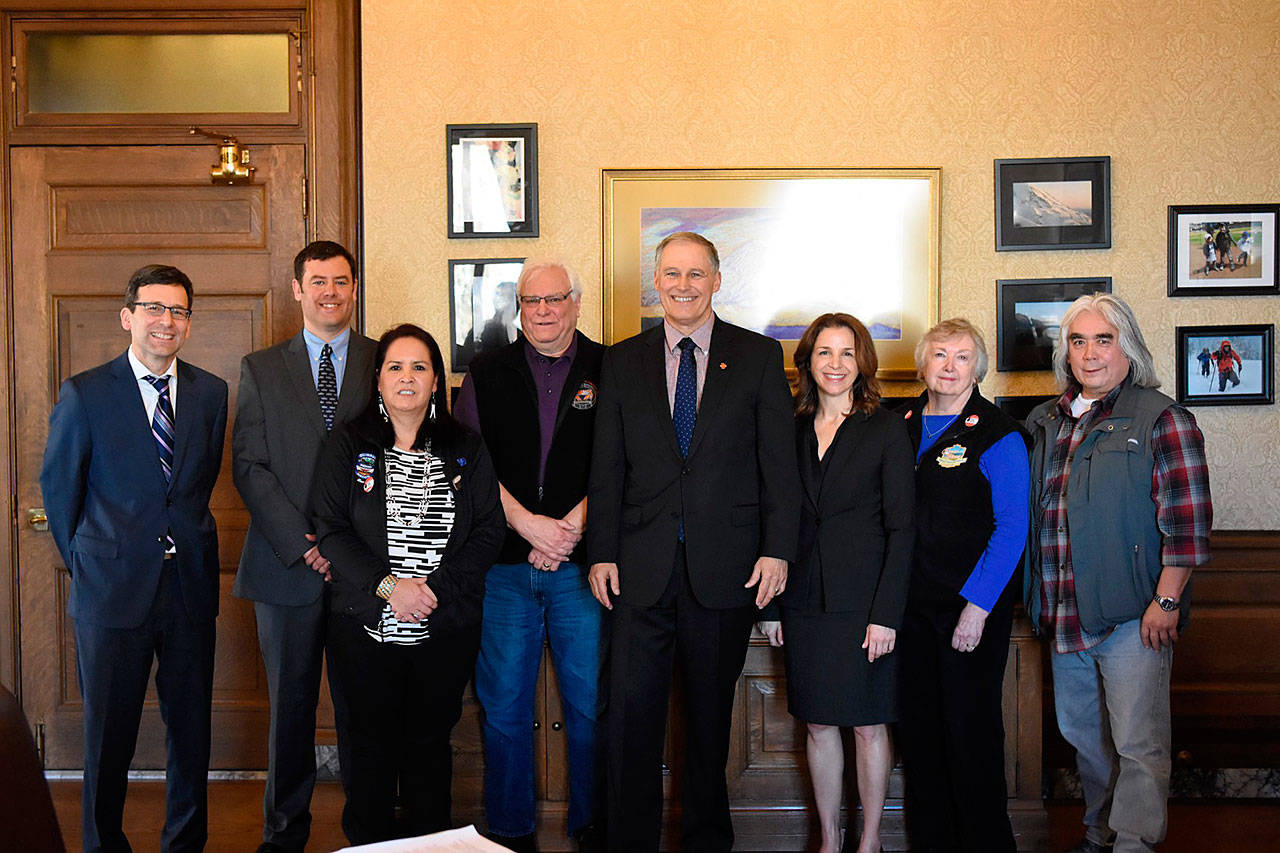Gov. Jay Inslee has formally asked the Trump Administration to remove the state from federal plans “to open waters off our coast to oil and gas drilling.”
And state Attorney General Bob Ferguson has said the state will sue the federal government if Department of Interior Secretary Ryan Zinke continues to support the proposal while removing Florida from waters that would be open for the same National Outer Continental Shelf (OCS) Oil and Gas Leasing Program for 2019-2024.
Inslee made his request in writing on Monday after an Olympia news conference with statements from a group that included Ocean Shores Mayor Crystal Dingler, Quinault Indian Nation representative Gina James, and Larry Thevik, president of the Washington Dungeness Crab Fishermen’s Association and an Ocean Shores resident.
In a letter to Zinke, Insleee said: “I have stated unequivocally that opening the Pacific Coast to new oil and gas drilling for the first time in decades poses grave danger to our state’s unique recreation, tourism, shipping, military and fishing industries, threatening thousands of jobs and billions of dollars in revenue each year.”
Inslee also publicly invited Zinke to visit the Washington Coast “where you will see firsthand how critical our coastlines are to the economic security and vitality of Washington’s industries, ports, tribes, fisheries and military communities.”
Ferguson likewise sent a formal letter to Zinke protesting the decision to grant an exemption to Florida, which he said spared that state “from the risks and burdens of drilling and exploration off its shores.”
“I ask that Washington receive the same exemption as Florida, and that no drilling or exploration be considered or take place off our coast,” Ferguson said. “If, on the other hand, the Department of Interior seeks to put Washington’s coastal communities at risk, my office will initiate litigation against the department to protect our coast.”
Dingler likened the Trump Administration policy to a “monumental environmental crises on the Washington Coast.” Ocean Shores and Westport each have passed resolutions opposed to oil and gas exploration and drilling.
“We are gravely concerned by efforts in the other Washington to open up our coast to offshore oil and gas exploration and drilling,” Dingler said. “If the oil rigs come, most of us won’t be able to see or hear them offshore, but we will see the effects of their presence on our beaches in tar balls, in the health of our marine life, and in a failing tourism economy.”
She noted Ocean Shores alone hosted nearly 5 million people in 2017.
“Tourism is our primary business and it depends on clean and safe beaches where families can bring their children,” Dingler said.
Thevik said many of the people he represents “have witnessed firsthand the difficult task of recovering oil from coastal waters and shorelines.
“The 11 million gallons of crude oil that spilled from the Exxon Valdez (1989) soiled 1,300 miles of Alaska’s coastline. I lost a season to the Exxon Valdez, and my vessel was chartered to document the estimated 56,000 seabirds from the 1988 Nestucca oil barge spill off of Grays Harbor,” Thevik said.
At best, Thevik calculated, the total amount of oil that could be found off the Washington coast would only serve to supply the equivalent of 20 days worth of U.S. oil consumption.
“It threatens our state’s entire coast and contradicts decades of established policies and statutory protections,” Thevik said during the press conference with the governor. “Offshore drilling carries risks we do not want to take, we do not need to take, and we must not take.”
James noted the Quinault Nation has about 30 miles of pristine and undeveloped coastline, supporting one of the largest Dungeness crab, shellfish and salmon fisheries in the region. Quinault fishing business contributed $27.6 million in direct wages and salaries for 668 people, according to a 2015 economic study.
“This proposal to open up the continental outer shelf to exploration and development is a severe threat to our federally guaranteed treaty rights and our traditional way of life,” James said.
“The Quinault Indian Nation is fully invested in fighting for our rights, and we’ll continue fighting for our rights, whether it’s through the courts, protesting, or through other appeals through the state,” she added.



